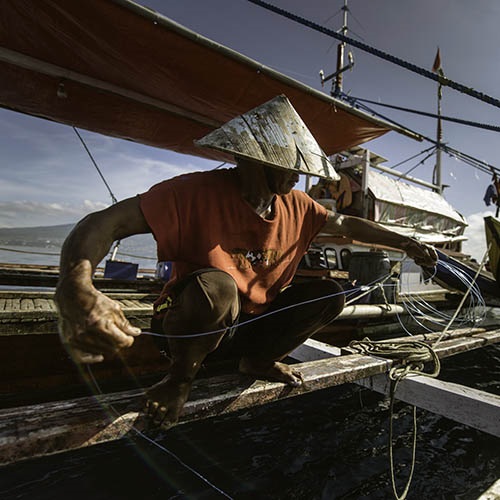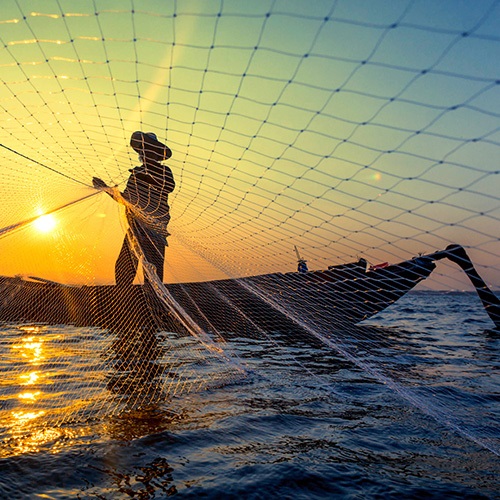Maria Teresa Tavera Ortiz (Autonomous University of Baja California) and Mexico Baja California red sea urchin diver-caught fishery
Amount awarded: £5,000
This project aims to understand whether the quality of red sea urchin gonads (sex organs) in the Mexico red sea urchin fishery can be improved through a translocation project without affecting the wider ecosystem.
The Mexico red sea urchin fishery harvests red sea urchins using divers on hookah gear aboard small vessels, referred to locally as “pangas”. The divers use compressed air that is delivered through a tube, allowing them to say submerged in the water and selectively harvest the sea urchins one at a time. The sea urchins are exported to Asia, where the gonads are a local delicacy.
Local fishers are, however, concerned that in recent years, the yield and condition of gonads in the fishery are decreasing, which could affect the profitability of the fishery. A project has already begun led by The Secretary State of Fisheries and Aquaculture in Baja California and fishers but its success and risk to the wider ecosystem needs to be scientifically monitored.
What the project will do
The project led by a PhD student at Autonomous University of Baja California (UABC), will involve evaluating the translocation of individual red sea urchins from an area of low kelp abundance (source) to an area of high abundance of kelp (target). There is a close link between kelp abundance and urchin gonad quality. The more kelp is depleted, the worse the quality of the gonads as they thrive of the nutrients the algae provide.
It’s thought that translocation could offer a "win-win" situation, allowing the depleted kelp areas time to recover while the urchins thrive in their new home, that is abundant with kelp.
Sea urchins are important herbivores in a kelp ecosystem, consuming the plant matter. Past studies have shown that artificially increasing sea urchin herbivory pressure can lead to negative impacts. There is therefore a careful balance to be found when considering translocation. Disruptions to the wider ecosystem could result in compromising the recovery of some urchin banks which are locally depleted or even other species like California spiny lobster or abalone.
The research team, comprising of Maria Teresa Tavera Ortiz, PhD Researcher, José Alberto Zepeda-Domínguez, Assistant professor and Luis Malpica Cruz, Researcher will work closely with the fishers, using their local ecological knowledge to design the experiments, monitor and evaluate the results of the project.
The fishery is one of the most important small-scale fisheries in the region, providing direct and indirect employment for local coastal communities. The project will provide solid evidence so that the fishery improvement project (FIP) leaders can implement informed decisions, strengthening the recovery of the red sea urchin banks and quality of their gonads.
Background
The fishery has been part of the Fish for Good program, supporting 25 fisheries around the world to implement sustainable fishing practices. Its progress in a comprehensive FIP is also independently verified by assessors each year through the In-Transition to MSC Program. The research follows a previous Transition Assistance Fund grant awarded to the fishery in 2020, to help understand the stock health of the sea urchins.
“This funding is the most important I have received in my training as a researcher. I consider obtaining this incentive not only recognises me but also the contribution of Mexican women in science, which makes me feel very proud. I feel motivated because through this project we can build knowledge between scientists and fishers, focussed on generating a common good. I’m also excited to collaborate with and listen to children - they should be included in all projects concerning the future and wellbeing of their community.”
Autonomous University of Baja California, Mexico
Find out more

Our impact projects
Discover projects supported through the Ocean Stewardship Fund that are helping to grow sustainable fishing worldwide.

The Ocean Stewardship Fund
The Ocean Stewardship Fund offers grants to both MSC certified sustainable fisheries and improving fisheries.
